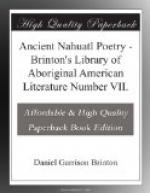TETZCOCO, now TEZCUCO, 14, 35, 36, 77. Capital city of Acolhuacan, and residence of Nezahualcoyotl. It has been called “the Athens of Anahuac.” The derivation of the name is from a plant called tetzculli (Cod. Ramirez).
TEZOZOMOC, TEZOZOMOCTLI, 35, 39, 67, 88, 89. A ruler of the Tepanecas, celebrated for his warlike skill and severity. His death is placed in the year 1427. The name, like Montezuma, is derived from zoma, to be angry, in this case from the reduplicated frequentative form, zozoma.
TIZATLAN, 103. “The place of white varnish” (tizatl), the name of one of the four quarters of the city of Tlascala.
TLACOMIHUATZIN, 93. “The noble cousin of the lynx” (tlacomiztli, lynx, huan, postpos., denoting affinity, tzin, reverential). The name of a warrior.
TLACOPAN, now TACUBA, 135. A small state west of Mexico and subject to it, built up on the ruins of the ancient Tepanecas. Comp. from tlacotli, a slave.
TLAHUICAN, 118. A Nahuatl province south of the valley of Mexico, so called from the cinnabar, tlahuitl, there obtained (Buschmann; but the Cod. Ramirez gives the meaning “toward the earth,” from tlalli and huic). [Transcriber’s note: TLAHUICAN not found in text. See Tlahuica in Vocabulary.]
TLAILOTLACAN, 140. One of the seven divisions of the city of Tezcuco (Ixtlilxochitl, Hist. Chichimeca, cap. 38). [Transcriber’s note: TLAILOTLACAN not found in text.]
TLAILOTLAQUI, 84. Literally, “workers in refuse,” or “scavengers.” Said by M. Aubin to have been a tribe who settled in Tezcuco in the reign of Quinantzin. The term is apparently one of contempt. [Transcriber’s note: TLAILOTLAQUI not found on page 84 in text. See Tlailotlaqui in Vocabulary.]
TLALMANALCO, 42. A village near the foot of the volcano Popocatepetl. Derived from tlalmanalli, level ground, with postpos. co.
TLALNAHUACATL, 89. “Dweller on the land;” name of a warrior.
TLALOC, 45. God of rain and the waters; a famous divinity among the ancient Mexicans. The word means “stretched on the earth,” and the idol of the god represented a man extended on his back holding a vase.
TLAPALLAN, 105. A mythical land from which the Toltecs were fabled to have come and to which Quetzalcoatl returned. The derivation is from tlapalli, color, especially red.
TLATETOLCO, TLATILULCO, 33, 83, 85. A suburb of the ancient city of Mexico, founded in 1338; from tlatelli, a mound, ololoa, to make round, the sense being “an island.” See Motolinia, Historia de los Indios, Trat. III, cap. 7.
TLAXCALLAN, now TLASCALA, 89, 93, 103. “The place of bread,” from tlaxcalli, bread. Site of a warlike tribe of Nahuatl descent, east of the valley of Mexico.
TLATZIN, 46. Chief of a town of the Chichimecs, situated on Lake Chalco. He flourished toward the close of the 14th century. From tlatli, a falcon.




